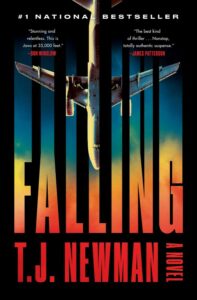
Putting your life in the hands of an airplane family (LA skies to New York, and Playa del Rey neighborhood near Los Angeles International Airport (LAX); present day): The next time you find yourself buckling your seat belt on a plane, you may think differently, more appreciatively, about the people you’ve temporarily turned your life over to – the Captain and copilot locked in the cockpit and flight attendants in the cabin – after reading T. J. Newman’s authentic thriller, Falling. These “strangers turned kin” are trained to treat every passenger as “souls,” each flight as “family.”
Newman hasn’t just crafted edge-of-your-seat suspense, but asks character-trait questions about what makes someone courageous and others afraid. Qualities that dig deeper, to something undefinable about what we’re made of that we can’t know until our backs are pressed hard up against the wall.
In this non-stop, high-octane thriller, Captain Bill Hoffman couldn’t be put to a more superhuman test to stay in command of a “mass of humanity hanging in limbo” when he’s flying Flight 413 on fictional Coastal Airlines with 146 passengers and crew on board (along with copilot, Ben Miro, whom Bill hasn’t flown with before). Tension and action are swift as he learns on page 25 that his wife, Carrie, ten-year-old son Scott, and baby Elise have been taken hostage in their home by a terrorist. If it weren’t for personal technology, he wouldn’t have known a terrorist had set his plot into motion. The terrorist’s demand is simple – “either crash your plane or I will kill your family” – but vowing not to sacrifice any lives in the air and on the ground couldn’t be more fraught.
No amount of aviation training could prepare anyone for how they’d act when faced with such monumental decisions. A five-hour flight from LAX to New York’s JFK International Airport becomes an eternity when Bill sees Carrie wearing a suicide vest, with a black hood over her head and Scott’s head too. You’ll shiver at how easily the terrorist enters their home, how this could happen to any one of us. In the skies, Newman had plenty of real-world airplane scenarios and disasters to drive her imagination, which isn’t far-fetched.
In this nightmare, the aviation training described is from the standpoint of flight attendants since Newman spent ten years flying for Virgin America and Alaska Airlines, crafting much of her debut during “red-eye flights,” showing she’s fully in command of her story. A publishers’ bidding war resulted in a two-book, seven-figure advance with foreign rights already sold to thirty countries. Readers will be clamoring for her second book, because Falling is that good. So good it’s already been opted for a Universal Pictures movie. No surprise since the novel feels like you’re watching an airplane disaster film on the big screen, never letting go until the last 13 or so pages.
How does the author create such an immersive experience, where nearly every word sets the stage and is written with an eye for building suspense?
Equally interesting is the backstory to bringing this novel to fruition. Given Newman’s writing chops that show she knows her way around books too (a former bookseller) and her seasoned aviation experience, why did 41 literary agents reject the novel? Delivering so much authenticity, these many rejections defy the publishing industry’s release of thrillers that scream commercial value. Like Falling.
What makes this aviation novel stand out are also the moral questions asked. How much pressure can any single human being handle? What would you do if you were the captain? The flight attendant? One of the passengers?
This air-and-ground terrorist story shows us how vital flight attendants are. Clearly, one of Newman’s messages. Flight attendants may politely serving us drinks and food, but only one day is spent on customer service during their five-weeks of training. Everything is focused on life-saving skills, starting with reading body languages the moment a passenger steps inside the plane, to judge who could be relied upon to assist during an emergency?
In an engaging NPR interview, Newman said she could, for the most part, accurately predict who’d order what type of drink. In the novel, it’s accurately pinpointing who’ll be an ABP – an Able Bodied Person.
The author drew from her own experiences, but she also talked to lots of pilots to understand what they went through inside the cockpit once closed off to the rest of the cabin as a consequence of September 11th. Despite Captain Bill being instructed by the terrorist not to utter a word of what’s being demanded of him in his locked compartment, he knows he cannot possibly protect the passengers without the assistance of the three flight attendants in the cabin.
Bill Hoffman wasn’t supposed to fly that plane on that day, so when he kissed the “love of my life” goodbye in their Playa del Rey home, he started the flight already carrying a burden: he’d promised to attend Scott’s opening baseball game, so when he leaves Carrie’s mad at him. He’s got to compartmentalize guilty feelings of loving a job that necessitates constant leaving and re-entering his family’s lives, now left in grave danger without a way to protect them.

By Travis Stoffs [GDFL] via Wikimedia Commons
Falling conjures images of the 9/11 “Let’s Roll” passengers whose flight ended horrifically. It also reminds us of the miracle of Captain “Sully” Sullenberger who saved 155 people by landing Flight 1548 safely on the Hudson River. Tom Hanks played Sully in the movie; “nice” Hoffman comes across as a younger version of one of the nicest actors around. The movie tells the “inside story” like Newman fictionally does, with the reader praying for a miracle.
Jo, older than Bill, is the flight attendant in the front of the cabin who’s foremost; Michael and Kellie are in the back. Jo is SO good and dear – personally, competently, courageously – you’ll wish she was part of your family. A long-time friend of Bill and Carrie, her trust in Bill is “bedrock,” so is ours in her, along with Michael who doesn’t go by his real name. He’s called Big Daddy for all the right reasons despite his five-foot-three frame. Kellie is the flight attendant you wouldn’t choose for a terrorized flight, because she’s a newbie. What you’ll still see is teamwork and “communication passed off like a baton,” reinforcing the message that we’re all in this together. That we need each other if we’re hoping to survive.
Newman strategically injects the crew’s past in italicized paragraphs that can run a page or two, using this literary technique effectively to reveal how our pasts affect the present. Including the terrorist’s. Revealing his name by page 30, lessening our stereotyping of him because Khani is a popular surname in a number of countries. Little by little, we learn his motives, building to a crescendo.
Sometime in the 1980s, the word stewardess was changed to flight attendant to raise awareness of the profession’s role. Falling may be the gold standard showing us why.
Lorraine